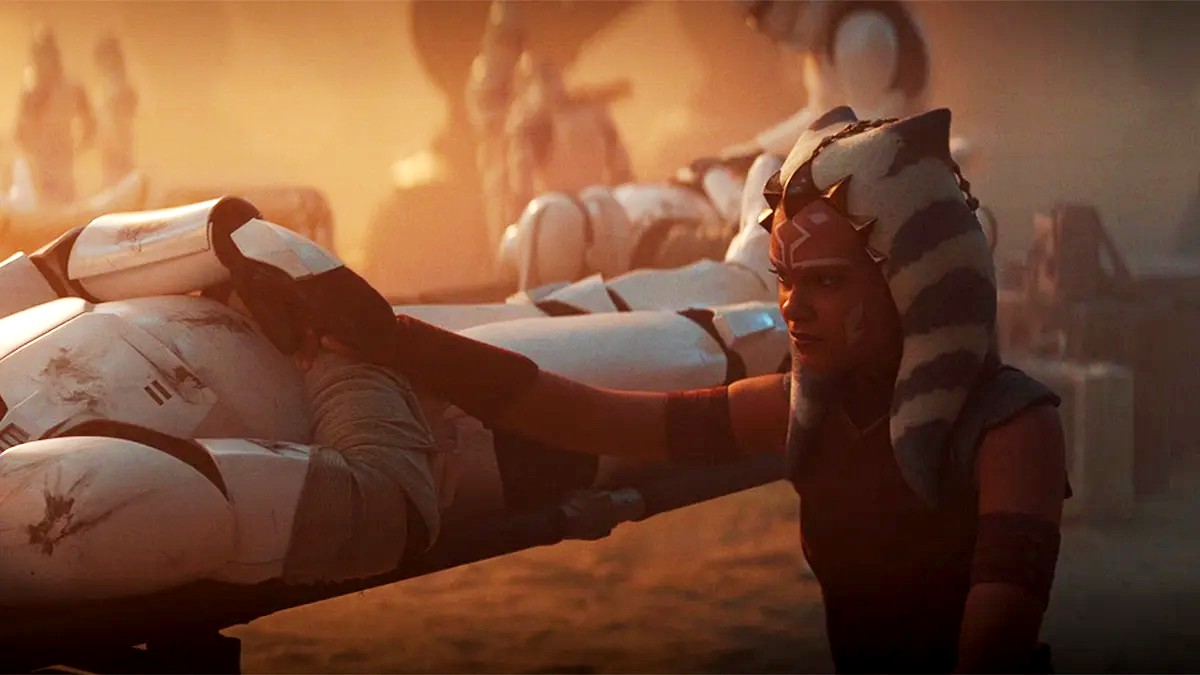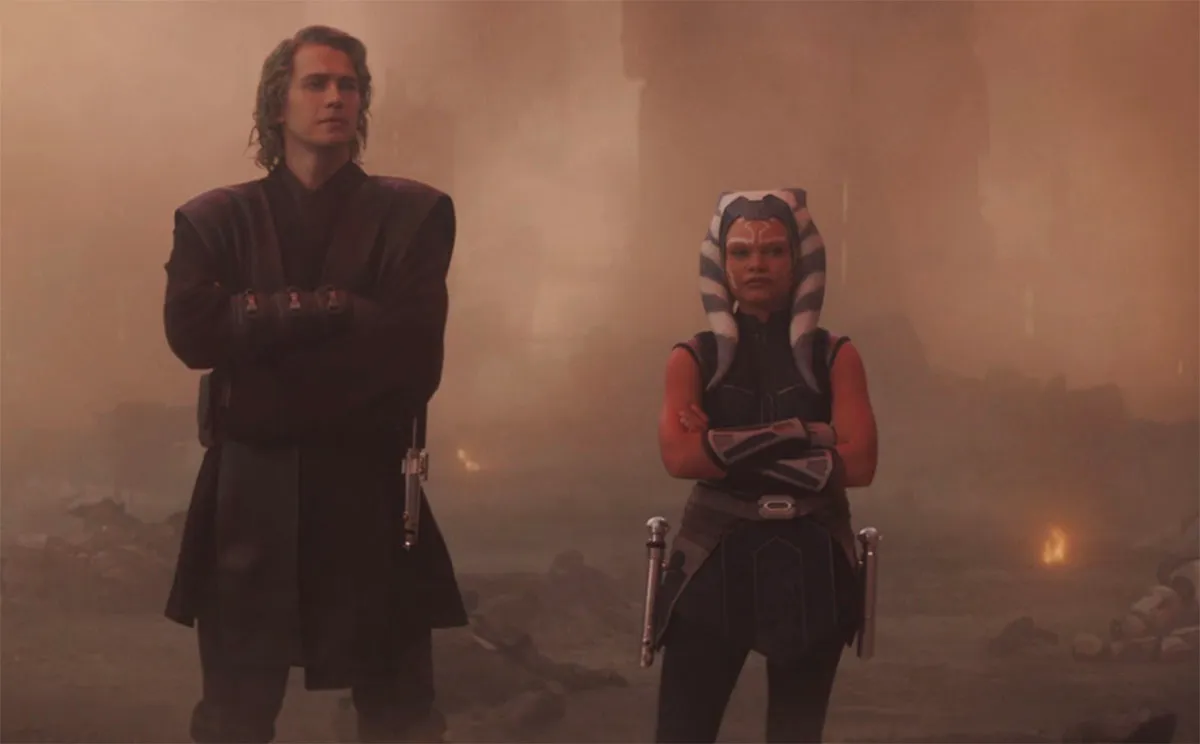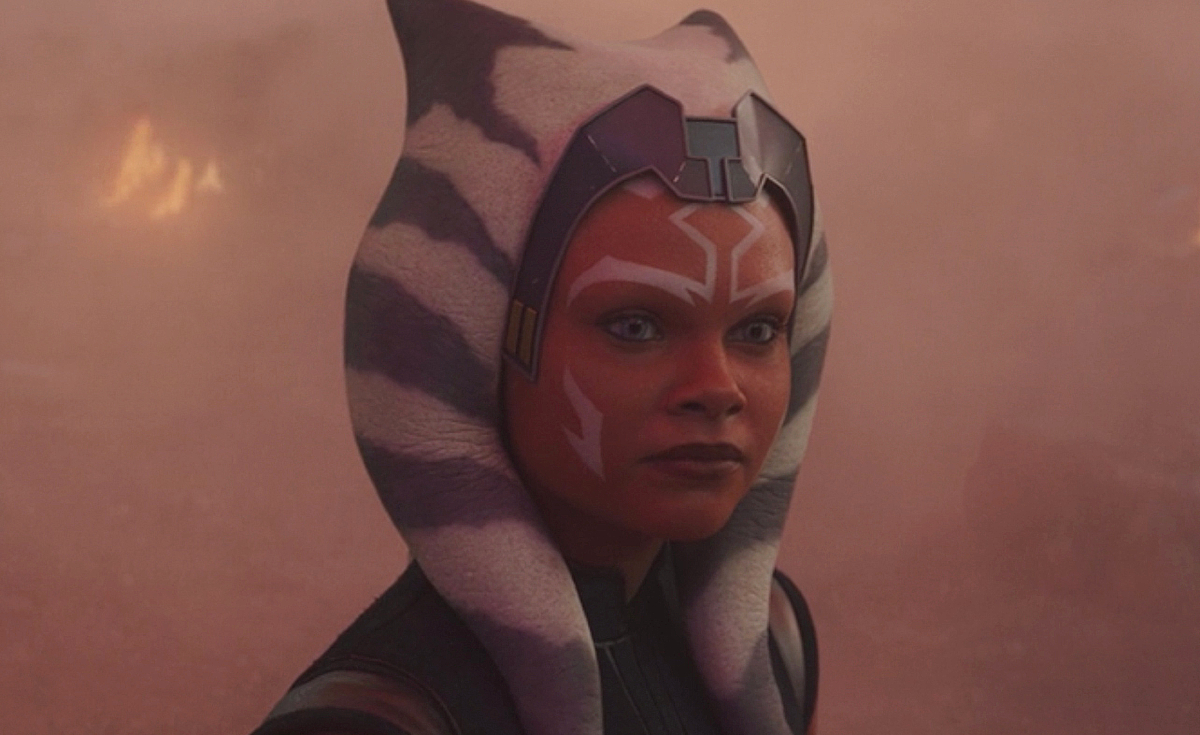‘Ahsoka’ Reminds Us of One of the More Morally Ambiguous Aspects of the Jedi Order

Ahsoka episode 5, “Shadow Warrior,” brings Young Ahsoka to live-action for the first time. While Ahsoka Tano (voiced by Ashley Eckstein) was just 14 when she was first introduced in the animated series Star Wars: The Clone Wars, Rosario Dawson introduced Tano to live-action as an adult in The Mandalorian and reprised the role in Ahsoka. However, a live-action Young Ahsoka was necessary, with episode 5 delving into Tano’s most formidable memories. Ariana Greenblatt, one of Hollywood’s fastest-rising young stars, takes on the role of Young Ahsoka, portraying the character during her time as a padawan under Anakin Skywalker (Hayden Christensen).
Unfortunately, her memories aren’t about her affectionate bond with Skywalker but about war. This is because the Clone Wars were underway when she became Skywalker’s padawan. Meanwhile, Skywalker was a General in the Republic Army leading his own battalion, so Tano really didn’t have a choice but to accompany him into battle when she was placed under his care. As a result, she trained more as a soldier than a padawan. This was covered in Star Wars: The Clone Wars, but Ahsoka really helps hone in on just how young Tano was when experiencing war.
That’s because, instead of a relatively mature animated design, we see Young Ahsoka depicted in live-action by a girl who actually was around 14 at the time of filming. Greenblatt beautifully captures Tano’s confusion and determination as war rages around her and the emotional toll of seeing her fellow soldiers injured. Additionally, you’ll notice that she sticks out in every scene she’s in. It’s because she’s a child amid many full-grown adult soldiers. So, of course, she looks small, vulnerable, and out of place in a smoky battlefield with Clone Troopers rushing into battle and succumbing to explosions and blaster bolts. It’s impossible to miss that she’s just a child, making you question why she was at these battles in the first place.
Did the Jedi Order use child soldiers?

Ahsoka‘s latest episode reminds us that Tano was a child soldier and that the Jedi Order was seemingly okay with this. After all, the Jedi Order decided to place Tano as a padawan under Skywalker’s supervision, knowing she would see battle if they did so. In doing so, it also forced Tano to go against her training. She expressed this sentiment in Star Wars: The Clone Wars, as she felt bitterness at being taught early on that Jedi were guardians of peace, yet her entire time as a padawan was spent as a soldier. In Ahsoka, she tells Skywalker again that war wasn’t what she was trained for, but he tells her that Jedi must “adjust to the times.”
Unfortunately, Skywalker’s sentiment was shared by the Jedi Order. When war broke out, padawans were no longer apprentices, trained one-on-one by a wise master until they were ready to become Jedi Knights. Instead, the Jedi Order saw them as resources for the Clone Wars, and many of them were tossed straight into battle and made Commanders with little experience. Kanan Jarrus (then known as Caleb Dume) was also made a commander at age 14, and Barriss Offee (Meredith Salenger) saw action in the Clone Wars as a teenager. Hence, Tano wasn’t an isolated incident—the Jedi Order used padawans, some as young as 14, as soldiers in the Clone Wars.
Was the Jedi Order immoral for using child soldiers?

While padawans like Tano were undoubtedly very skilled, that doesn’t mean they were ready for war. In Ahsoka, the young Tano blames herself for the loss of soldiers in battle because she was their commander, even though these lives never should’ve been put in the hands of a child. In Star Wars: The Clone Wars, we see Tano frequently disobeying orders and getting into dangerous situations during battle due to her youth. Meanwhile, Offee turned to the dark side due to witnessing the brutality of war as a child, while Jarrus later turned to alcohol as a young adult. Needless to say, the Jedi Order should not have been using child soldiers in the Clone Wars, and it clearly did negatively impact all the teenage padawans on the front lines.
Still, at least the Jedi Order didn’t stoop to the same level as the First Order. The First Order kidnapped children as young as three and forced them into servitude, molding them into subservient stormtroopers. In comparison, the Jedi Order’s usage of teenagers who voluntarily joined the Order and had ample training does seem less severe. However, considering that the Republic already had an army of clones, it does raise the question of how necessary these padawans were in war. One may also scrutinize the Jedi Order’s training of children in general, even in times of peace.
Younglings are typically taken into the Jedi Order before the age of six. As soon as their force-sensitivity is detected, they’re taken from their families and put on track for their lives to be devoted to the Order. While parents agreed to let their children be taken, these children couldn’t consent. Meanwhile, most were taken so young they couldn’t remember their families. Then, from this extremely young age, they’re trained to eventually take on military roles in the Republic. When you think about it, how much of a difference is there really between child soldiers and younglings?
There’s also the question of how ethical the use of clones in the army was. While the clones were genetically modified, it doesn’t erase the fact that they were sentient and human. Yet, the Republic rarely treated them as such. They were created to serve the Republic, even having their aging accelerated so that just a few short years after their creation, they’d be ready to go to war and very likely die for the Republic. These clones never knew anything besides war and death. Additionally, one may argue that they count as “child soldiers” in some sense. While they were aged quickly to make them adults, they certainly didn’t go through development in the same way adults do or boast all the experiences one might argue is necessary to attain an adult’s maturity.
All these things make us wonder why the Jedi Order’s morality hasn’t been questioned or criticized more openly in the Star Wars franchise. While most will have varying opinions about whether the Order acted immorally or was justified since what it did was done for the greater good, it can’t be denied that it definitely lost some of its humanity in its preoccupation with winning the war. Additionally, considering that the war was lost, it makes us think that what Tano, Jarrus, Offee, and the clones experienced wasn’t worth it, just as it doesn’t seem worth it for all those younglings who forgot their families only to become victims of Order 66.
(featured image: Disney+)
Have a tip we should know? [email protected]